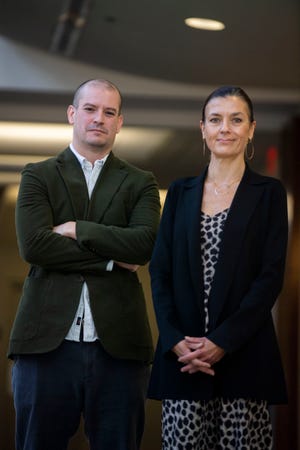Vanderbilt University School of Law in November created a lab dedicated to exploring how artificial intelligence will reshape the practice of law.
Its leaders believe it is the first of its kind in the country.
The idea for the Vanderbilt University Artificial Intelligence Law Lab (VAILL) came in early 2023, around the time news broke that the GPT-4 AI big language model had passed the bar exam, said co-directors Kat Moon and Mark Williams. (Not only did it pass, but it probably did better than your lawyer did.)
This caught people's attention.
“When you talk to legal professionals, everyone seems to mention that they've never seen an industry get caught up in technology the way this has, because the implications of (artificial intelligence) and what it can do are just that immediately obvious,” Williams said.

Vanderbilt Law School Dean Chris Guthrie decided to create a lab around these effects.
Housed in the law school's Law and Innovation Program, which Moon also co-directs, the lab will investigate how legal professionals use artificial intelligence. As of Dec. 15, Moon said she believes VAILL is the only lab at the law school “focused on AI for law.”
The lab will focus specifically on how artificial intelligence can help expand access to legal services for people who need them.
This need has become particularly acute recently. Moon noted that only 8% of the civil legal needs of low-income Americans were met in 2022, a decline from two years ago.
“I think that ethically, we have an obligation to understand how technology can help us serve more people,” she said.
In practical terms in the lab, this will look like developing curriculum, hosting workshops, helping with student projects, providing educational resources to law firms trying to figure out how they can use AI in their work and generally exploring seemingly endless questions, Moon said. Artificial law has sparked interest for those who practice law.

Right now, they don't have many answers.
“Do we have any answers?” Munn joked to Williams during the interview.
But that doesn't mean they aren't trying to find them.
“My mind is on fire with this stuff,” Williams said.
This kind of curiosity is something Moon said she hopes to instill in students. The focus is less on teaching students how to use specific AI tools in their work, but more on creating a mindset that is open to change, as the two co-directors believe the legal profession, which Moon says is designed for the second industrial revolution.
To do this, the co-directors hope to bring faculty from many different disciplines, from computer science to the humanities, to collaborate with the lab.
Moon and Williams said it's impossible to say what future uses of AI in law could look like, but think about chatbots to help self-represented litigants in the court process and the use of generative AI to help lawyers craft language for court filings.
The lab currently employs Moon and Williams, both of whom have other responsibilities, as well as a small support staff. It doesn't have a generous endowment, nor does it have a brick-and-mortar location yet — though that is in the works — prompting Moon to describe it as a “fickle startup.”
“We have ambitions to grow,” Williams said. “But now… as Kat says, we're building the rocket ship and we're riding in it.”
more:Vanderbilt University has aimed for excellence in divided times—throughout its 150-year history
HVan Mellens is justice reporter for The Tennessean. Contact him at emealins@gannett.com or follow him on X, formerly known as Twitter, @Evan MayaLinz.

